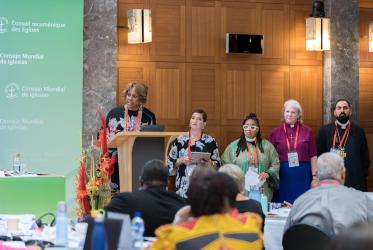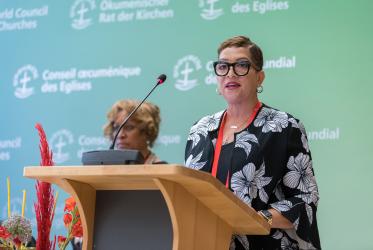The Canadian Council of Churches (CCC) has released a new “Faith and Witness” podcast that explores ecumenism.
The CCC’s Commission on Faith and Witness created the monthly podcast as a medium through which people from different faith traditions can talk in a candid way. The podcast also features people who have spent their lives in dialogue with Christians of other traditions.
The monthly podcast is available on iTunes as well Libsyn.
Jesse Hair, CCC’s communications officer, said the Commission wanted to explore podcasting as a way of drawing people into an ecumenical community in a new way. “This day and age, people would rather listen to a podcast or watch a video on the way to work,” he said.
The theme for the first series of podcasts is “Salvation," which was the main topic for the Commission's discussions in 2009-2012.
Giving people the experience of an unfolding dialogue will help them clearly see how ecumenical relationships develop, said Dr Mary Marrocco, associate secretary for the Commission. “Sometimes in ecumenical work we produce wonderful results, but all we see are the end results. This podcast is about the process.”
Each podcast features an unscripted conversation during which two people from different faith traditions discuss a given topic. In the first episode, Fr. Geoffrey Ready of the Orthodox Church in America (Canadian Archdiocese), and Rev. Ian Sloan of the United Church of Canada (UCC) talk about the idea of salvation, and how Orthodox and UCC beliefs about salvation are the same, and how they differ.
Their dialogue has the feel of two friends talking at the kitchen table. “It’s the laughter, and the quirky aspects of the conversation, the camaraderie, that is the essence of ecumenical work,” said Maria Simakova, coordinator for the Commission. “Ecumenical work is grounded in local communities.”
“It’s not talking about dialogue — it is dialogue," Marrocco added.
As conversations lengthen, the podcast dialogue becomes gradually more complex, reflecting a deeper theological conversation that happens at the Commission's table.”
Each podcast also features an interview with people who have devoted a significant amount of their lives to ecumenical work. Documenting those stories will broaden our understanding of the history of ecumenism, noted Marrocco. “The idea is that, in these interviews, we are hearing the stories of past and present ecumenism.”
The podcast’s producers also hope listening to the ecumenical conversation will help people become part of a worldwide ecumenical community. They are actively seeking feedback and comments from their listeners. “The idea is not a top-down approach,” said Marrocco. “It’s to invite them to a wider table, to invite them to respond.”





